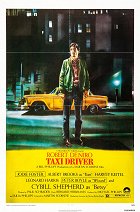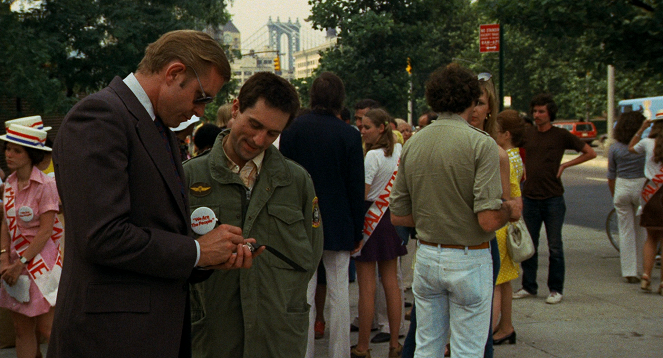Directed by:
Martin ScorseseScreenplay:
Paul SchraderCinematography:
Michael ChapmanComposer:
Bernard HerrmannCast:
Robert De Niro, Jodie Foster, Albert Brooks, Harvey Keitel, Leonard Harris, Peter Boyle, Cybill Shepherd, Diahnne Abbott, Frank Adu, Victor Argo (more)VOD (2)
Plots(1)
At 26, Vietnam veteran Travis Bickle (Robert De Niro) is slipping slowly into isolation and violence on the streets of New York City. Trying to solve his insomnia by driving a yellow cab on the night shift, he grows increasingly disgusted by the people who hang out at night: "Someday a real rain will come and wash all the scum off the streets." His touching attempts to woo Betsy (Cybill Shepherd), a Senator's campaign worker, turn sour when he takes her to a porn movie on their first date. He even fails in his attempt to persuade child prostitute Iris (Jodie Foster) to desert her pimp Sport (Harvey Keitel) and return to her parents and school. Driven to the edge by powerlessness, he buys four handguns and sets out to assassinate the Senator, heading for the infamy of a 'lone crazed gunman'. (Columbia Pictures US)
(more)Reviews (12)
The dollar may have had significantly more power in the mid-70s than it does today, but the fact remains that the movie only cost a mere 1.9 million, which is unbelievable. Nevertheless, money for the project was hard to come by, and it took a long 3 years for Scorsese and De Niro to make it happen. The screenwriter used a real-life successful assassination attempt on presidential candidate George Wallace in 1972. However, the film is not a crime story in the ordinary sense; rather, it is a psychological drama about a Vietnam War veteran who cannot readjust to society upon his return home. Gradually, he becomes the opposite of Jack, the founder of the Fight Club in Fincher's famous film. Jack embodied the dissatisfaction of the radical urban intellectual left and the idea of an anarchist rebellion against the system. On the other hand, Travis is closer to the positions of the radical right; he watches with concern and increasing contempt as life unfolds in a decadent metropolis full of loose sexual morality, crime, and existential insecurity. Both anti-heroes share not only chronic insomnia but also a protest against the world they want to rid of falsehoods. If Travis had carried out his plan to the end, he would have been seen as the archetype villain by the public. However, Scorsese allows his character to live on and even makes him famous in the eyes of the public. Ironically, he thus caricatures the double morality of bourgeois society. Travis' multiple murder of members of the urban gallery turns him not into a terrorist but into a courageous fighter against the underworld. Even members of the liberal urban elite are not spared. The activist Betsy represents the epitome of a snob, and presidential candidate Palantine is a typical example of a professional chatterbox who speaks in vague phrases. Scorsese benefited greatly from not taking a clear activist stance. During its creation, Taxi Driver sparked numerous controversies and passions. In a few years, it became a cult film, and rightly so, unlike many other works. It has definitely not aged; the character of Travis Bickle still unsettles viewers to this day. From my perspective, it is Robert De Niro's most significant role. A bonus for today's viewers is the fact that the supporting actors grew into first-class stars over the following decades. Overall impression: 95%.
()
Taxi Driver is the third best film made by Scorsese and De Niro after Raging Bull and Wise Guys. But of all the above, it has by far the best music - Herrmann's ending to his career is divine. How a few notes can capture not only the environment in which the film takes place, but also the mental turmoil of the main character... It's breathtaking. You see the opening credits (which Richard Donner pays homage to in Gibson's Ransom) and you know - this is going to be SOMETHING. And it is.
()
I waited twenty years to see one of Martin Scorsese’s most famous movies on the big screen in a festival atmosphere. It finally happened, moreover with a freshly restored version released by the restorers themselves. And nothing happened – at most, Taxi Driver is a valuable testimony of the period, place and mood of 1970s New York, which gives it historical significance (I’ve recently praised similar qualities in Sidney Lumet’s Serpico). The innovative and creative camerawork and Bernard Herrmann’s dark music are also excellent. However, the screenplay and its treatment of the protagonist are cold and aloof and take too many shortcuts, and the climax looks almost absurd, in a cartoonish fashion, as though it was a dramaturgically botched attempt at editing a more concise and epic work.
()
Taxi Driver is probably a movie that I will appreciate much later than in my twenties. It is a huge reaction to today’s society, which cannot be monitored. It is only possible to fight it, but the question is whether the fight will change the society or the person who is trying to fight against it. In this film, Robert De Niro made it clear that it is easier for him to change than for the society. With that he created an absolutely unbelievable scene towards the ending, which made me really sick. Even worse were the consequences, which could not be overlooked. Martin Scorsese shot a very good film, but I couldn’t deal with its story. And that was the biggest stumbling block. Otherwise, it’s an example of absolutely great filmmaking, which will be hard to match.
()
Quite shabby and very much “about nothing”. I don’t see anything exceptional about Taxi Driver. De Niro acts like in every film – almost all his roles are the same to me – and I still can’t bring myself to like Scorsese. It’s a shame, but I’ve already come to terms with the fact that the best works of these two gentlemen will never say much to me.
()


Ads